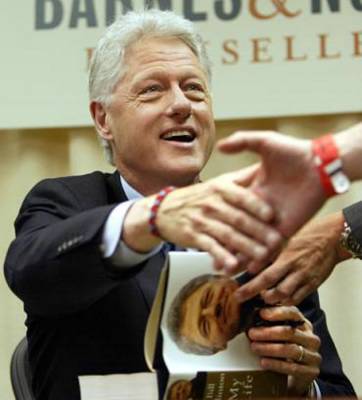We ask him about the red and blue crocheted band around his right wrist -- an incongruous clash with the statesman attire.For the first time in the interview he becomes emotional, the voice catching and his eyes redening. "I've worn it for two years. I went there [to Colombia] and met these unbelievable kids from a village on the edge of the rainforest where the narco-traffickers are dominant," he says. "They sang and danced for peace and I fell in love with these kids. I asked them to perform at the White House one Christmas. They came with the culture minister, a magnificently attractive woman called Consuelo. The bad guys hated these kids because they made them look like what they are. The guerillas couldn't kill these children, so they murdered her ... I can still hardly talk about this.
"Two years ago they asked me back and I said, 'I'll come, but you've got to bring those kids to see me.' So I turn up -- and the children greeted me at the airport, along with the new culture minister -- the niece of the murdered woman. And they gave me this bracelet, which I've never taken off."
Here, Mr. Clinton talks about how he learned to forgive his enemies:
We ask whether, as a Christian himself, he had been able to forgive Starr. "I couldn't have done it without two people, both in Africa," he says. "One was a Rwandan woman, a survivor of the slaughter. She lived next to a Hutu couple. Their children played together for 10 years. The couple rat 'em out. They come and crack her across the back with a machete and she's left for dead. She wakes up in a pool of blood and looks around and her husband and her six children are dead. She's the only survivor. And she said, 'I screamed at God for letting me live with all them dead and then I realised I must have been spared for some purpose. It could not be something as mean as vengeance.'[emphasis added]
"What was the lesson for me? What I went through was a tea party compared to that woman. I lost nothing compared to what she did. You know, I had my reputation in tatters, I was bankrupted, I was enraged because other people were persecuted who were completely innocent. It was nothing.
"The other person who helped me was Nelson Mandela. He told me he forgave his oppressors because if he didn't they would have destroyed him. He said: 'You know, they already took everything. They took the best years of my life, I didn't get to see my children grow up. They destroyed my marriage. They abused me physically and mentally. They could take everything except my mind and heart. Those things I would have to give away and I decided not to give them away.'
"And then he said: 'Neither should you.' And he said when he was finally set free he felt all that anger welling up again and he said, 'They've already had me for 27 years ... I had to let it go'. You do this not for other people but for yourself. If you don't let go it continues to eat at you."
The article also includes several interesting excerpts from President Clinton's book, including a list of the books that helped Mr. Clinton get through the scandal involving Monica Lewinsky:
- The Imitation of Christ by Thomas a Kempis (classic Christian text that deals with pride, suffering, self-centredness, materialism and anxiety).
- The Meditations of Marcus Aurelius (putting Stoicism into practise as a means of coping with adversity).
- Seventy Times Seven[re-titled version Why Forgive? available as free e-book on this page] by Johann Christoph Arnold (reflection on the stories of "real people" who have dealt with injuries from crime and betrayal and abuse, that stresses forgiveness as the only way of surviving life's deepest hurts).
- John 8:7 ("If any one of you is without sin, let him be the first to throw a stone at her.")
Father, let me dedicate All this year to you
In whatever earthly state You will have me be
Not from sorrow, pain, or care Freedom dare I claim;
This alone shall be my prayer: Glorify Your name.
--from New Year's Hymn by Lawrence Tuttiett, 1864 (alt.)
In whatever earthly state You will have me be
Not from sorrow, pain, or care Freedom dare I claim;
This alone shall be my prayer: Glorify Your name.
--from New Year's Hymn by Lawrence Tuttiett, 1864 (alt.)


